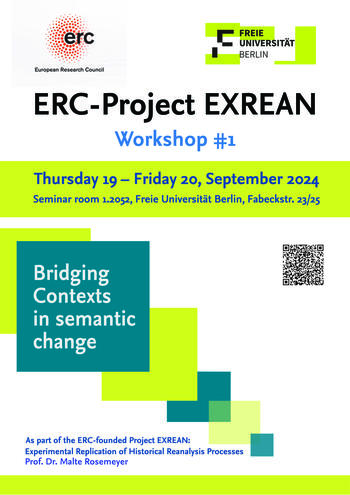Bridging contexts in semantic change
The concept of bridging context is central to the study of semantic change. It is well known that the transition from meaning A to B always involves a phase of polysemy, in which both meanings coexist in one form. Bridging contexts, partly corresponding to what Diewald (2002) terms critical contexts, are contexts that allow for an interpretation in terms of either the original meaning or a new meaning (cf. Evans & Wilkins 2000, Heine 2002). Such contextual settings are regarded as “the places where extended meanings commonly have their genesis” (Evans & Wilkins 2000: 550).
Aim of the workshop and invited contributions
The aim of this workshop is to critically assess the role and empirical reality of bridging contexts in the development of new meanings. We are particularly interested in the following questions, and many more:
• Do we need to assume bridging contexts to explain semantic change? Through which mechanism do bridging contexts facilitate reanalysis?
• What is the role of synchronic variation? Are there better and worse bridging contexts?
• Do we need to distinguish bridging contexts and switch contexts, as proposed in the literature?
• Does exposure to bridging contexts have a cumulative effect on reanalysis?
• With what frequency must a given form appear in bridging contexts for us to take it as an indicator of incipient meaning change?
Specific topics addressed by the talks in the workshop are the role of bridging contexts as the locus for reanalysis, inferential mechanisms leading to semantic reinterpretation, challenges in determining what rate of use of a given item in specific contextual settings can be taken as an indicator of language change, and the study of synchronic variation as a starting point for inferring diachronic processes.
Speakers and discussants:
- Patrícia Amaral (Indiana University)
- Gabriele Diewald (Leibniz Universität Hannover)
- Martín Fuchs (FU Berlin)
- Chiara Gianollo (University of Bologna)
- Eitan Grossman (HUJI Jerusalem)
- Maj-Britt Mosegaard Hansen (University of Manchester)
- Julia Heine (FU Berlin)
- Matti Marttinen Larsson (University of Gothenburg)
- Silvina Espíndola Moschner (FU Berlin)
- Peter Petré (University of Antwerp)
- Malte Rosemeyer (FU Berlin)
- Stefan Schneider (University of Graz)
- Freek van de Velde (KU Leuven)
- Richard Waltereit (HU Berlin)
- Anne Wolfsgruber (HU Berlin und FU Berlin)
Program
|
Day 1: Thursday, September 19, 2024 |
|
|
08:45-09:15 |
Registration opens |
|
09:15-09:30 |
Silvina Espíndola Moschner & Malte Rosemeyer (FU Berlin) Opening |
|
09:30-10:15 |
Gabriele Diewald (University of Hannover) Narrowing of meaning as a possible resolution of ambiguity in critical contexts |
|
10:15-10:45 |
Coffee break |
|
10:45-11:30 |
Patrícia Amaral (Indiana University) What context can mean |
|
11:30-12:15 |
|
|
12:15-13:45 |
Lunch |
|
13:45-14:30 |
Maj-Britt Mosegaard Hansen (The University of Manchester) Bridging contexts. Salience vs frequency |
|
14:30-15:15 |
Anne Wolfsgruber (HU Berlin und FU Berlin) On the role of persistence, bridging contexts, and constructional networks in (extreme) language contact |
|
15:15-15:45 |
Coffee break |
|
15:45-16:30 |
Peter Petré (University of Antwerp) The role of personality type in neoanalysis and constructional change |
|
16:30-17:15 |
Julia Heine, Martín Fuchs & Malte Rosemeyer (FU Berlin) Experimental replication of historical reanalysis processes (EXREAN) |
|
Day 2: Friday, September 20, 2024 |
|
|
09:00-09:45 |
Stefan Schneider (University of Graz) Extensional constructs in language change |
|
09:45-10:30 |
Freek van de Velde (KU Leuven) Walking the rickety bridge. A work-around for the real problem of fuzzy attestations in corpus linguistics |
|
10:30-11:00 |
Coffee break |
|
11:00-11:45 |
Chiara Gianollo (University of Bologna) Diachronic reanalysis with Italian salvo: semantic and morphosyntactic aspects |
|
11:45-12:30 |
Silvina Espíndola Moschner (FU Berlin) Between modality and aspect: The periphrases saber and soler + infinitive |
|
12:30-13:00 |
Closing remarks |
Time & Location
Sep 19, 2024 - Sep 20, 2024
Seminarraum: 1.2052
Freie Universität Berlin
Fabeckstr. 23/25 (Neubau Kl. Fächer)
